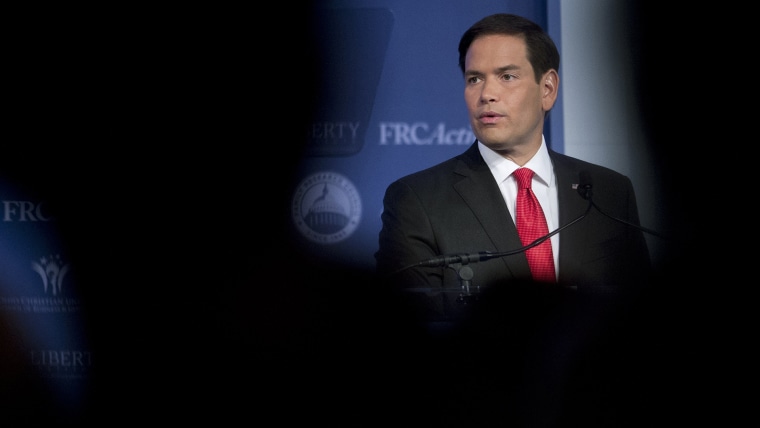The most damaging political controversies tend to be the easiest to understand. To this extent, Sen. Marco Rubio's (R-Fla.) current flap has the potential to do some harm: in the broadest sense, it's a story of a presidential candidate who's made a mess of his personal finances and who's made claims about the controversy that don't appear to be true.
Rubio's rivals are likely to present a question the typical voter will probably find pretty straightforward: should a politician who's struggled to responsibly oversee his own finances be trusted to help oversee the entire country's finances?
It's the details, however, that get a little more complex. The New York Times reported this morning:
A decade after he began using a Republican Party credit card for personal purchases like paving stones at his home, Senator Marco Rubio on Wednesday pledged to disclose new spending records from that account as he sought to inoculate himself against what could be his biggest liability as a presidential candidate: how he manages his finances. The decision to release the records highlights the enduring potency of a controversy rooted in Mr. Rubio’s days as a young state representative in Florida that he and his aides thought had been put to rest with his 2010 election to the Senate.
I'm not sure I'd characterize this as Rubio's "biggest liability" -- his bizarre mishandling of the immigration issue strikes me as more important -- but as Republican primary voters weigh their 2016 choices, the senator's difficulties in managing his own money probably won't do his candidacy any favors.
The basic outline is made up of a few embarrassing elements. During his time as a Florida legislator, for example, Rubio occasionally mixed personal and business expenses, including using party money to repair his minivan, and charging $10,000 to attend a family reunion, which is legally questionable, before eventually paying the money back. He also co-owned property with a scandal-plagued colleague, failed to detail the mortgage on financial disclosure forms, and then faced foreclosure.
There's also the odd liquidation of Rubio's retirement account -- even after the senator received a seven-figure book deal -- and the fact that he took on more than $900,000 in debt when his net worth was about $8,300.
But it's Rubio's evasiveness and apparent misstatements that arguably matter just as much.
For example, Rubio has acknowledged improperly using a Republican Party credit card for personal use, but at least so far, he's "refused to provide credit card statements from 2005 and 2006."
The GOP senator said yesterday he intends to release the records “in the next few weeks.” Why it's taken so long to prepare the records -- materials Florida journalists have sought for years -- is unclear.
Rubio has acknowledged “a lack of bookkeeping skills,” which may or may not bother voters. But there's the related question of whether he's been fully forthcoming about his messy finances.
For example, Rubio said yesterday that he went through his charges "every month" and reimbursed the personal expenses initially paid for with party money. However, the Tampa Bay Times reported, “Records show Rubio sent payments to American Express totaling $13,900 for his personal expenses during his tenure as House speaker. But those payments were not made monthly. He made no contributions to the bill during one six-month stretch in 2007, the records show.”
Rubio also said yesterday, "[E]very expense on that card is detailed in the Republican Party accounts that they file every month with, reports that they have to file with the state." But this doesn't appear to be quite right, since there are still two years of undisclosed charges.
Rubio claimed two weeks ago that all of these line of inquiry have been "discredited." But we know this isn't true -- all of these questions point to evidence that hasn't been refuted. Indeed, let's not forget that while a state ethics commission did not pursue the matter against Rubio, a commission investigator accused Rubio of "negligence" on the credit card issue, adding that his failures were "disturbing."
As a general defense, the presidential candidate said yesterday, "[The] bottom line is I obviously don't come from a wealthy family." That's true, but I'm not sure how it's relevant. The typical American doesn't come from wealth, either, but they don't routinely find themselves in the kind of messy situation Rubio created.
Put it this way: if Hillary Clinton's finances were this messy, some of her documents went undisclosed for years, and some of her claims appeared dubious under scrutiny, isn't it fair to say it'd be the biggest political story in the country?
